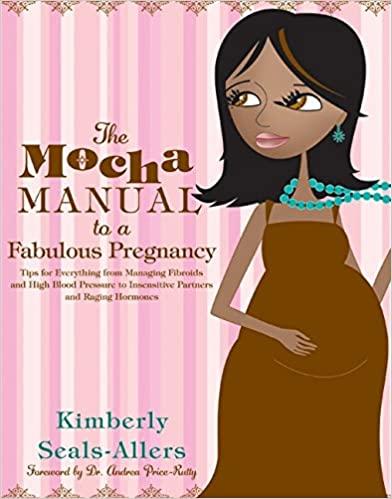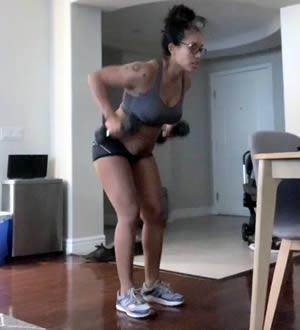A Pregnancy Reading List for Brown Girls - For Each Trimester and Beyond
Most of my pandemic clinics have been in person, but the occasional working from home gave me time for some leisure reading in pregnancy
There’s the old saying, “don’t judge a book by its cover,” but when most of the pregnancy book covers feature white women or white authors, I had to create my own diverse and inclusive reading list. So here it is:
First Trimester (weeks 0–14): pregnancy explained
I generally lose interest in non-fiction books, so I didn’t want the traditional “What to Expect…” literature to tell me about pregnancy. I wanted to read about how it feels to be pregnant. I was aware of the physical symptoms from my residency in obstetrics and gynecology. But I wanted to learn about the emotions and how to navigate the normal symptoms. In addition, with apps like “Baby Center,” “Bump,” and “Flo,” there’s no shortage of free content that describes normal pregnancy.
- The Mocha Manual to a Fabulous Pregnancy, Kimberly Seals Allers
Because I was pregnant throughout the early pandemic, I couldn’t get together with my mom friends or join prenatal classes to meet other first-time moms. This book was like talking to one of my friends about the good, bad, and ugly of being pregnant. She also included some great info at the end about legal stuff (that I admittedly need to get around to), like setting up a will. The author is a journalist who has become an advocate for Black women’s maternal health.
- Expecting Better: Why the Conventional Pregnancy Wisdom Is Wrong — and What You Really Need to Know , Emily Oster
One of my pregnant friends recommended this to me years ago while in training as young doctors. This is the book for women who are willing to listen to their healthcare providers and go to their scheduled prenatal visits, but also question whether the occasional glass of wine or bite of sushi is going to ruin their growing baby. The author is an economist and does a good job of laying out the research behind common medical advice regarding fertility and pregnancy. At the same time, she makes the info easy to digest and enjoyable to read.
- The Pregnant Athlete: How to Stay in Your Best Shape Ever — Before, During, and After Pregnancy, Brandi Dion et al.
It’s 2020, y’all. Serena Williams won the 2017 Australian Open at 20 weeks pregnant, and fitness in pregnancy is known to be crucial for a healthy pregnancy and beyond. I came across all kinds of “advice” on the popular pregnancy advice forms — to avoid tennis, to avoid raising your arms overhead, avoid lunges…the list goes on. Even doctors misinform pregnant patients. My first doctor flat out told me to stop doing CrossFit. Fortunately I found a doctor that cared for competitive CrossFit athletes in their pregnancies. This book is organized by week and offers suggestions for movements throughout pregnancy and postpartum. The author is a triathlete, and co-authors are her coach (and partner), as well as an ob-gyn. I referenced this often in pregnancy and afterwards.
This book was part of a women’s group book club at my church. Reading it during the pandemic was SO timely. Pregnancy is beautiful and intimate, but at times can feel very isolating. This was especially true for me during the pandemic, particularly when my partner had to isolate outside of our home for almost a month due to him having COVID. Braving the Wilderness helped me reflect on belonging in the context of family, as well as what that means when I am alone.
Second Trimester (weeks 14–28): mothering and mother-daughter relationships
As I mentioned above, I’m not so into non-fiction. I think that fiction literature is much more illuminating with regards to the human condition. In other mediums (media?), it’s hard to follow a story and also see inside characters’ minds the way a reader can with fiction. With that in mind, I really enjoyed leisure reading in the middle part of my pregnancy. I didn’t want to stress too much about the “how to’s” of being a new mom. I wanted to learn about motherhood through a diverse group of women, and the following books helped me do that:
- What We Lose: A Novel, Zinzi Clemmons
This book is about an American whose identity spans multiple continents, as her parents are from South Africa. The story had me in tears. It discusses the heartbreak of losing a mother to cancer and the poignant yet fulfilling experience of becoming a mother after her mom dies. The main character’s loneliness really hit a nerve as I was pregnant in the pandemic, with my own mother in the Philippines and wondering if I may not see her with the baby for a while due to travel restrictions. Reading this book made me feel seen and less alone.
- The Joy Luck Club: A Novel, Amy Tan
As an Asian-American (my mom is Filipina), I am embarrassed that it’s taken me this long to get to this classic. It was originally written in 1989, but to me it’s a timeless tale of generational differences between Chinese moms and first-generation American daughters. I could relate to the daughters’ struggles to explain their American-ness to their traditional Chinese mothers. There is a universal element of love underlying all the main characters’ stories — that despite their differences, the love between mothers and daughters was fierce.
- Happiness: A Memoir: The Crooked Little Road to Semi-Ever After, Heather Harpham
There’s a conventional wisdom that moms are strong, but no one really warns us ahead of time that being a mom requires some real, intense strength. I’m talking legit, gonadal fortitude. Heather Harpham puts her gonadal fortitude on display in this story of mothering a child with a rare blood disease from birth. This also comes in the midst of a relationship in turmoil, as her partner is not quite on board when baby arrives. Through separation from the father of her baby, then reconciliation during her daughter’s chemotherapy, I was able to see a glimpse of the mama strength I’d need myself once my own daughter arrived.
This story follows a woman from a tribal, traditional community in China, through her relationship with an opium addict, her escape from that relationship and drug-war at the Southeast Asian “Golden Triangle,” to an ultimate fairytale ending in suburban Los Angeles. Throughout that journey, she eventually reunites with a child she had out of wedlock and abandoned as a baby. The story is incredible, but I was really taken by the persistence and mama-sense, or intuition, the main character has to find her child.
My own mother comes from the Igarot tribe in the Phililppines. She grew up on a farm without running water or electricity. She didn’t wear shoes until high school. The last time I went to her hometown 20 years ago, there were no direct roads to her village, only a long trail off a dirt road. I could see my mom in this story, even though her life in the Philippines is worlds apart from how I grew up in the U.S. This novel from Lisa See helped illustrate the maternal instinct to be with her child, even when tradition and circumstance make that difficult.
- Mom & Me & Mom, Maya Angelou
I went through a Maya Angelou phase in middle school, where I read all her books on the library shelf. I hadn’t read this one, but it details Dr. Angelou’s relationship with her mother, which is only mentioned in her other books. I’m obsessed with Dr. Angelou, who began her career as a dancer in nightclubs (I’m pretty sure if my mom knew what I was reading in middle school she would’ve had me wait a few years-Dr. Angelou’s life was pretty racy!). Dr. Angelou spent most of her childhood living away from her mother, and their relationship was on-and-off throughout her adulthood. I appreciated that despite not having a perfect mom, or being a perfect daughter, May Angelou still honored and admired her mother for the incredible woman that she was.
- The New Jim Crow (Mass Incarceration in the Age of Colorblindness — 10th Anniversary Edition), Michelle Alexander
I read this as a faculty member in our USC OB/Gyn residency’s Diversity and Inclusion Committee. The bookclub started during the racial justice protests over summer 2020, and it helped provide context to the frustrations playing out over our country’s long history of police brutality. It’s not really uplifting pregnancy reading material, but it’s the kind of book I’d want my daughter to know.
Third Trimster (weeks 28–40+): prepping for baby
This is when I buckled down and started learning more about actual baby and pregnancy stuff. I relied less on books and more on resources from doulas or Baby Center about nesting and getting things ready for the newborn. I was obsessed with learning about breastfeeding and baby sleep — I bought a lot of books I didn’t get to read. I found these two books so useful that the other books I bought were never read.
Dr. Karp is a pediatrician and details his theory of “the fourth trimester” in this book. The whole idea revolves around how newborns need the first 3–4 months to adjust to life outside the womb. It set me on a journey of swaddling my baby arms down, which my mom didn’t understand or agree with. But the swaddling and other tips in the book did help me immensely.
I do think that Dr. Karp’s expectations about infant sleep were a little unreasonable — it felt a little like he laid out a game-plan that, if followed, should lead to baby sleeping through the night at 12 weeks. I even used the SNOO “smart sleeper” bassinet in addition to following most of his recommendations, and at 4 months my daughter still awakens every 3–4 hours overnight to feed (and she hates most of the SNOO features!). Turns out that is very common, and for some moms doing 1–2 feeds overnight may continue until 1 year old. Yes, some babies sleep through the night, but some babies also wake up every 1h. Additionally, sleep doesn’t linearly improve for a lot of babies — it does get better overall, but they may go through sleep regressions as well.
At this point, I think it’s more important that a baby’s sleep patterns fit the overall family. A lot of people are happy to co-sleep with their baby in the same bed, which is STRONGLY discouraged by the American Academy of Pediatrics. On the other hand, some people have their baby’s sleeping in another room in a crib or on a Montessori mattress on the floor (also not recommended by most experts). There’s a ton of variation in between. If baby waking overnight drives a family insane, then maybe more aggressive sleep training needs to happen early. If the family and baby are happy with their sleep setup, then that’s great.
What worked for me was to do baby-led feedings early on, and to pay attention to my baby’s natural rhythms with wake windows during the day. I actually enjoy feeding and cuddling her a couple times overnight. Sometimes she wakes up more, and a few glorious times she’s slept for 6 hours. So all in all, while I appreciate this book, I took Dr. Karp’s advice with a grain of salt.
- The Womanly Art of Breastfeeding: Completely Revised and Updated 8th Edition, Diane Wiessinger et al.
This book from La Leche League came highly recommended from friends, though with a caveat — it’s a little heavy on the anti-medical establishment sentiments. The book begins with discussing how medicalized-birth in Western medicine is essentially ruining the birth and breastfeeding experience. As a former obstetrician, I don’t take offense to that — I do think women should be informed about their options for pregnancy and labor care. However, most women get epidurals in the U.S., a lot of women get pitocin in labor, and for the vast majority of women breastfeeding will go fine if they choose to feed their baby that way.
What this book does well is it discusses the normal breastfeeding experience, and why so many women give up early. The first few weeks to month are hard — the breast engorgement is incredibly painful, positioning the baby is awkward, and new moms are managing all of this on top of sleep deprivation, bleeding like it’s their longest period ever, and other general birth recovery. This book helped me mentally prepare for all of that, and I referenced for troubleshooting and to prepare for going back to work.
Postpartum: skimmed in survival mode
I didn’t read any of the below books cover to cover, but I read enough of each book to help me get through my initial postpartum period.
- Whoa, Baby!: A Guide for New Moms Who Feel Overwhelmed and Freaked Out (and Wonder What the #*$& Just Happened, Kelly Rowland
Yes, Destiny’s Child’s Kelly Rowland is also an author! I wish I’d read this book in pregnancy. Like the Mocha Manual above, it’s like talking to a good friend about the nitty gritty of motherhood. Kelly covered all my “is this normal” questions in this book. She also does it in a way that’s pretty entertaining — highly recommend.
- The Good Sleeper: The Essential Guide to Sleep for Your Baby — and You, Jane Krone Kennedy
After I’d read Dr. Karp’s Happiest Baby and was wondering why my baby was still sleeping “only” 3–4 hours at 2–3 months, this book gave me permission to be okay with that. It helped me learn more about normal awake windows and timing my baby’s feeds and playtime. Although she also gives tips to promote baby “sleeping through the night,” she also emphasized letting bad moments be bad moments, and to really capitalize on the good days. So if baby was fussy, I felt okay with letting her fall asleep in my arms instead of worrying that I was conditioning her to not self-soothe. When she started sleeping well, I started transitioning her out of the swaddle. The sleep progress hasn’t been linear, but it is getting better overall. I credit this book with helping me navigate that.
- How to Fly (In Ten Thousand Easy Lessons): Poetry, Barbara Kingsolver
I went through a major Barbara Kingsolver phase in high school after reading The Poisonwood Bible for an English class. When I heard she had a book of poetry coming out, I ordered my copy of this book the same day. The poems talk about womanhood, relationships, and motherhood. I don’t typically read a lot of poetry, but I’ve enjoyed reading some out loud to my daughter.
- The Nursing Mother’s Companion, Kathleen Huggins
I admit I was a little turned off by the La Leche League’s book’s suggestions to consider leaving work or taking extended leave in order to breastfeed. I get that some women make that choice, but I also happen to enjoy my career. I didn’t want to feel guilty about that as a new mom. A coworker gave this book to me at my baby shower and I found it much more approachable than my other breastfeeding book. I used it more to help prepare for my transition back to work.
Up Next: the books I haven’t gotten to yet
- The Whole-Brain Child: 12 Revolutionary Strategies to Nurture Your Child’s Developing Mind, Daniel Siegl
- Operating Instructions: A Journal of My Son’s First Year, Anne Lamott
- Dear Ijeawele, or A Feminist Manifesto in Fifteen Suggestions, Chimamanda Ngozi Adichie
Comment if you have other books I should add to my list!






